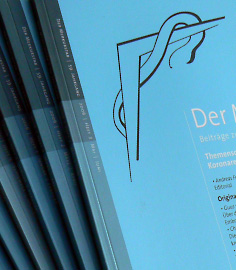
HEFT 2/2012
Der Merkurstab | März/April 2012 | 16,00 Euro (inkl. Mwst., zzgl. Versandkosten)

| Artikel | Sicherheit und Unbedenklichkeit von Chelidonium - ferm Urtinktur enthaltenden Arzneimitteln Safety of medical products containing chelidonium ferm mother tincture |
| Autoren | Gisela Stahnke, Nora Mörbt, Birgit Jäckel, Ulrike Sobeck, Ulrich Meyer |
| Seiten | 136-142 |
| Volume | 65 |
Zusammenfassung
Schöllkraut (Chelidonium majus L.) ist schon seit der Antike als Heilmittel bekannt. Bis heute sind Schöllkraut-haltige Arzneimittel ein wertvoller Bestandteil innerhalb der homöopathischen und anthroposophischen Medizin sowie der Phytotherapie. Wissenschaftlich belegte Indikationen phytotherapeutischer Schöllkraut-haltiger Arzneimittel sind Motilitäts- und Sektretionsstörungen im Magen-Darm-Trakt und im Leber-Galle-Bereich. Bei den anthroposophischen Chelidonium-haltigen Arzneimitteln steht neben der choleretischen und krampflösenden Eigenschaft im Bereich der Gallenwege und des Magen-Darmtraktes die gute Wirksamkeit bei Conjunktivitis sicca als auch bei verschiedenen Formen der Kropfbildung im Vordergrund.
Trotz des langjährigen Einsatzes im Leber-Galle-Bereich steht Chelidonium majus weiterhin unter Verdacht, durch die in der Pflanze enthaltenen Benzylisochinolinalkaloide, u.a. Sanguinarin und Coptisin, hepatotoxisch zu wirken. Zur Sicherheitsbewertung der in WALA Arzneimitteln eingesetzten wässrig-fermentierten Urtinktur Chelidonium majus e radice ferm (HAB-Vorschrift 34b) wurde ihre Wirkung auf primäre menschliche Leberzellen untersucht. Des Weiteren wurden verfügbare prospektive und retrospektive epidemiologische Daten zur Sicherheit Schöllkraut-haltiger Arzneimittel ausgewertet.
Zu den genannten Präparaten lässt sich weder aus den in vitro Versuchen noch aus den epidemiologischen Studien ein Risiko für hepatotoxische Effekte ableiten, so dass Chelidonium-haltige WALA Arzneimittel als unbedenklich betrachtet werden können.
Abstract
Celandine (Chelidonium majus L.) has been known as a remedy since antiquity. Today medicinal products containing celandine are still a valuable component in homeopathic and anthroposophical medicine as well as in phytotherapy. Scientifically proven indications for medicinal products containing celandine in phytotherapy are motility and secretion disorders in the gastrointestinal tract and in the liver-gall region. Besides acting choleretic and anticonvulsant in the region of the biliary and gastrointestinal tracts, anthroposophical medicinal products containing celandine are also quite effective in the case of dry conjunctivitis as well as in various forms of goiter formation.
Despite being used for many years in the liver-gall region, Chelidonium majus is still suspected of having a hepatotoxic effect because it contains benzylisochinolin alkaloids, including sanguinarine and coptisine. To evaluate the safety of the mother tincture Chelidonium majus e radice ferm (HAB Method 34b), which undergoes liquid fermentation, used in WALA medicinal products, its effect on primary human liver cells was investigated. In addition, available prospective and retrospective epidemiologic data on the effectiveness and safety of medicinal products containing celandine were evaluated.
For the mentioned medicinal products the risk of hepatotoxic effects could be derived neither from the in vitro experiments nor from the epidemiologic studies so that WALA medicinal products containing celandine can be regarded as harmless.
